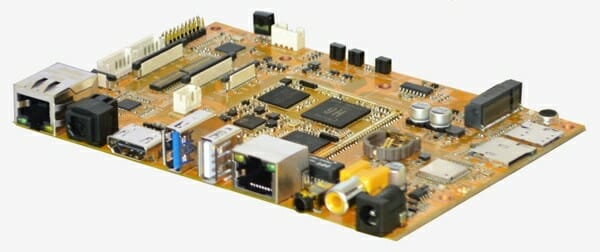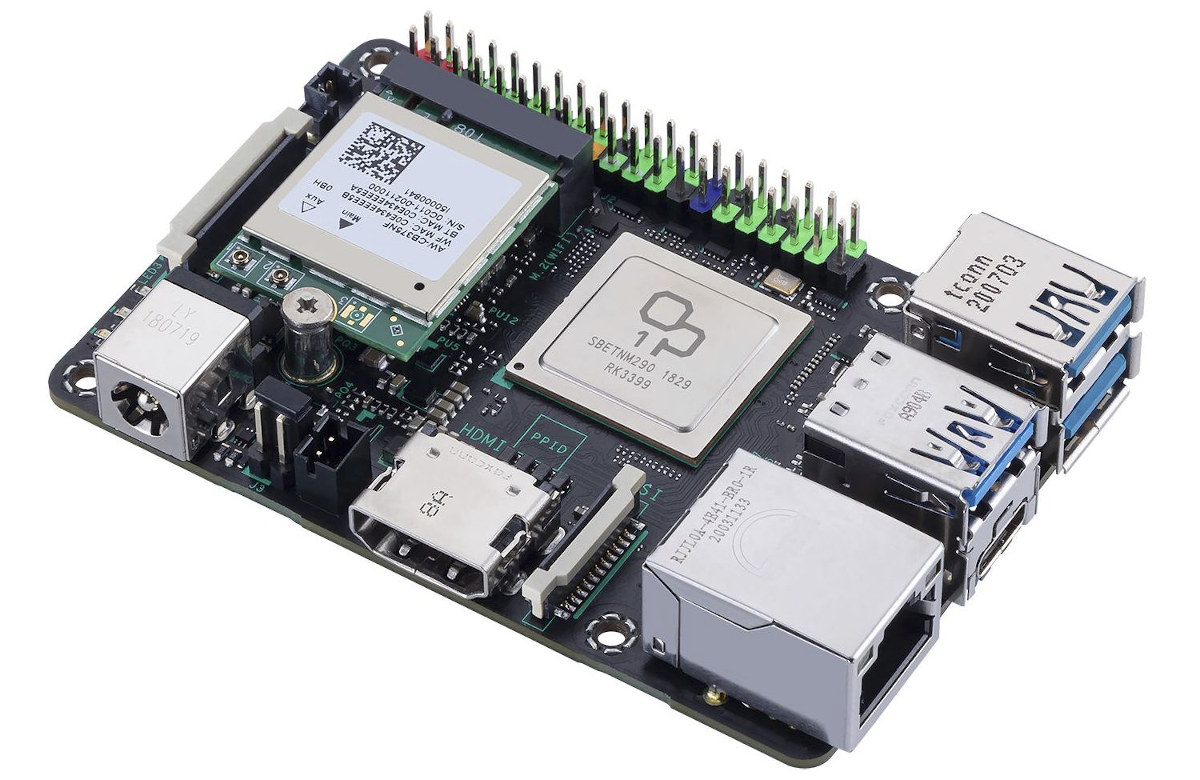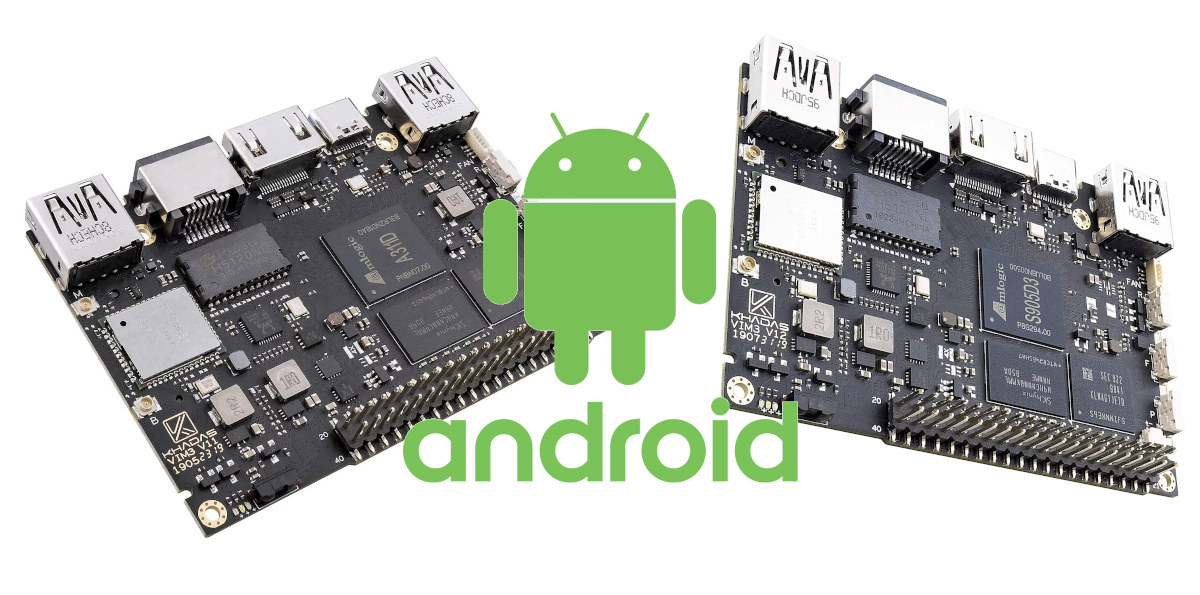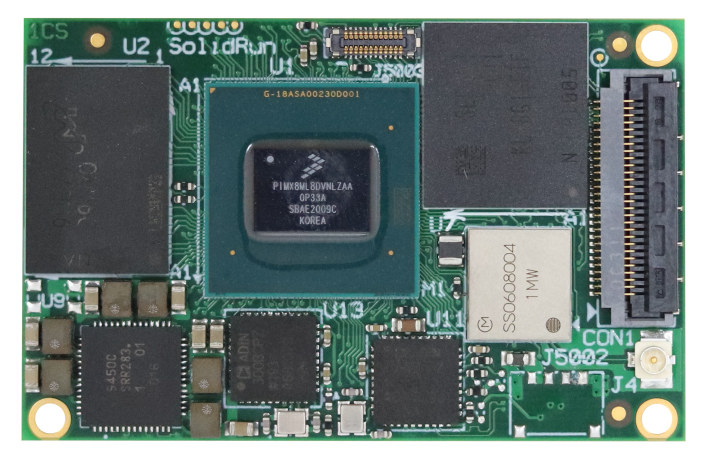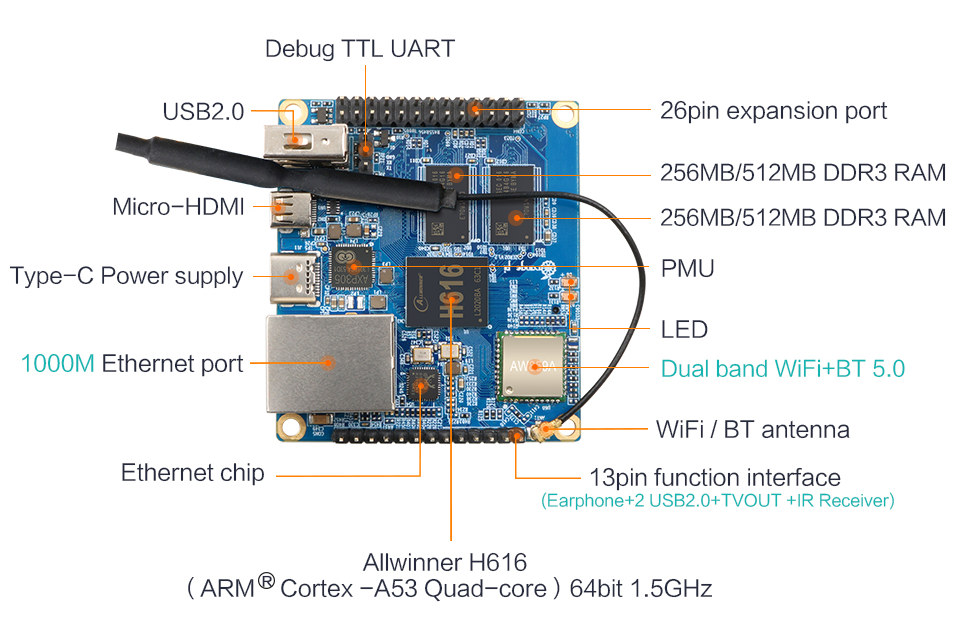While the processor was introduced in 2017, there are only a few Allwinner H6 SBC’s on the market with, for instance, Orange Pi 3 or Pine H64 boards, and it never became as popular as solutions based Allwinner H3 processor. But Boardcon has now launched its own Allwinner H6 SBC targeting professionals with Boardcon EMH6 board combining a carrier board and a computer-on-module that can be integrated into products. Boardcon EMH6 specifications: Core module SoC – Allwinner H6 quad-core Arm Cortex A53 processor with Arm Mali-T720 GPU with support for OpenGL ES3.1/3.0/2.0/1.1 System Memory – 1GB LPDDR3 Storage – 8GB eMMC Storage – MicroSD card slot, M.2 slot for NVMe SSD Video Output 1x HDMI 2.0a up to 4Kp60 1x CVBS interface 1x RGB interface or 2x eDP interface via NCS8801S RGB-to-eDP converter Backlight header Camera – 24-pin connector compatible with 13MP OV13850 camera sensor Audio – Optical S/PDIF output, […]
ASUS unveils Tinker Board 2 SBC with faster Rockchip RK3399/OP1 processor
ASUS surprised the maker community in 2017 with the introduction of the Rochchip RK3288 powered Tinker Board to compete as Raspberry Pi 3 Model B. It was followed by Tinker Board S with built-in storage and other new features, as well as Tinker Board Edge T and Edge R SBC’s both with an AI accelerator namely Google Edge TPU and the NPU inside Rockchip RK3399Pro. The company has now launched a new model called Tinker Board 2 without AI accelerator, but featuring Rockchip RK3399, or more exactly the higher grade Rockchip OP1 used in Chromebooks, delivering 96% faster single-thread performance and a 64% boost in multi-core performance compared to the Rockchip RK3288 processor found in the original Tinker Board, while the GPU is around 28% faster with glmark2-es2 off-screen benchmark. There are two variants of the board with Tinker Board 2 and Tinker Board 2S with the latter adding onboard […]
Reolink RLC-810A review – A 4K security camera with people & vehicle detection
Last week I received Reolink RLC-810A 4K smart security camera with support for people and vehicle detection. I listed the specifications and check out the content of the package of the first security camera I’ve received with artificial intelligence. That should be great to avoid all unnecessary alerts from motion detection I get from my “dumb” IP cameras. In this review, I’ll write a small guide showing how to use the camera with the Reolink app, the web interface, and check out RTSP and ONVIF support. I’ll also see if people and vehicle detection lives up to my expectations. Reolink RLC-810A Camera installation and setup As noted in the first part of the review, the camera does not come with a power adapter and does not support WiFi. So I had to find a 12V power adapter and used a 15-meter Ethernet cable to connect it to my router. Before […]
Khadas VIM3 & VIM3L SBC’s become Android reference boards
If you need to work on the very latest development version of Android or AOSP, you can either get one of the supported phones such as Google Pixel 5, one of the reference boards for Android which should be better for development and also fairly cheaper. We previously reported about Hikey, Hikey960, and DragonBoard 845c single board computers being part of the short list of reference boards for the Android Open-Source Project (AOSP), but Amlogic powered Khadas VIM3 and VIM3L have recently been added to the official devices page which makes them the first AOSP reference boards with a dedicated NPU / AI accelerator. As a quick reminder, Khadas VIM3 is the most powerful board with an Amlogic A311D hexa-core Cortex-A73/A53 processor with up to 4GB RAM and 32GB flash, and Khadas VIM3L is the light version with an Amlogic S905D3 quad-core Cortex-A55 processor with 2GB RAM and 16GB flash. […]
SolidRun launches i.MX 8M Plus SOM and devkit for AI/ML applications
SolidRun already offers NXP based solutions with AI accelerators through products such as SolidRun i.MX 8M Mini SoM with Gyrfalcon Lightspeeur 2803S AI accelerator, or Janux GS31 Edge AI server with NXP LX2160A networking SoC, various i.MX 8M SoCs and up to 128 Gyrfalcon accelerators. All those solutions are based on one or more external Gyrfalcon AI chips, but earlier this year, NXP introduced i.MX 8M Plus SoC with a built-in 2.3 TOPS neural processing unit (NPU), and now SolidRun has just unveiled the SolidRun i.MX 8M Plus SoM with the processor together with development kits based on HummingBoard carrier boards. Specifications: SoC – NXP i.MX 8M Plus Dual or Quad with dual or quad-core Arm Cortex-A53 processor @1.6 GHz (industrial) / 1.8 GHz (commercial), with Arm Cortex-M7 up to 800MHz, Vivante GC7000UL 3G GPU (Vulkan, OpenGL ES 3.1, OpenCL 1.2), 2.3 TOPS NPU, 1080p60 H.264/H.265 video encoder, 1080p60 video […]
Qualcomm QCC5141 Earbud reference design supports TrueWireless Mirroring and Hybrid ANC
Qualcomm has recently unveiled an earbud reference design based on the company’s QCC5141 low-power premium-tier Bluetooth SoC that supports TrueWireless Mirroring and Hybrid Active Noise Cancellation (ANC). What are TrueWireless Mirroring and Hybrid ANC? Qualcomm TrueWireless Mirroring technology relies on only one earbud to maintain the Bluetooth connection with the smartphone, while the secondary bud mirrors the connected bud. If the connected earbud is removed, the secondary earbud assumes the connection with zero interruption. The technology enables both a better, more stable connection and lower power consumption Hybrid Active Noise Cancellation (ANC) is designed to provide high-quality immersive experiences and enable natural leak-through of noise to allow for awareness of surroundings. Qualcomm ANC is fully integrated into this QCC5141 chip to reduce the complexity, cost, and PCB space of adding ANC to earbuds and hearables. QCC5141 Earburd Reference Design Key features and specifications: WiSoC – Qualcomm QCC5141 single-chip Bluetooth SoC […]
CarDongle replaces Android Auto with an Android 9.0 USB computer (Crowdfunding)
[Update Feb 16, 2021: CarDongle used to be called CarDroid, but the company had to change the product name. The rest of the post still uses CarDroid] Many cars now sell with Android Auto support but infotainment systems compatible with Google’s mobile app may have limitations and that’s why we have started to see third-party solutions such as AAWireless adapter to enable wireless Android Auto on more cars. Since Android Auto compatible hardware can’t be easily or cheaply upgraded, CarDroid Innovations has introduced CarDroid USB computer that works with Android Auto but instead runs Android 9.0 on a quad or octa-core Cortex-A53 processor clocked at up to 2.0 GHz with improved performance and access to more apps. CarDroid specifications: SoC – Unnamed quad or octa-core Cortex-A53 processor @ 2.0 GHz (Likely Amlogic S912 octa-core processor, advertised at 2.0 GHz, but whose real max frequency is 1.5 GHz, and maybe Amlogic […]
Orange Pi Zero2 Allwinner H616 SBC runs Android 10 or Linux
Last year, Shenzhen Xunlong Software unveiled Orange Pi Zero2 SBC as an update to the popular Orange Pi Zero board with a faster Allwinner H6 processor, HDMI 2.0 video output, USB 3.0 port, Gigabit Ethernet, and WiFi. Just one little problem: AFAIK they never sold it. But Orange Pi Zero2 board is now back with another design features instead equipped with a newer Allwinner H616 processor supporting Android 10, and various Linux distributions such as Ubuntu and Debian. Orange Pi Zero2 (2020) specifications: SoC – Allwinner H616 quad-core Arm Cortex-A53 processor @ up to 1.5 GHz with Arm Mali G31 MP2 GPU with support for OpenGL ES 3.2 and OpenCL 2.0 Memory – 512MB or 1GB DDR3 Storage – 2MB SPI flash and MicroSD card slot Video Output Micro HDMI 2.0a port up to 4Kp60 Video composite (CVBS) via 13-pin header (See Expansion section) Video Decoding 10-bit H265/HEVC up tp […]


